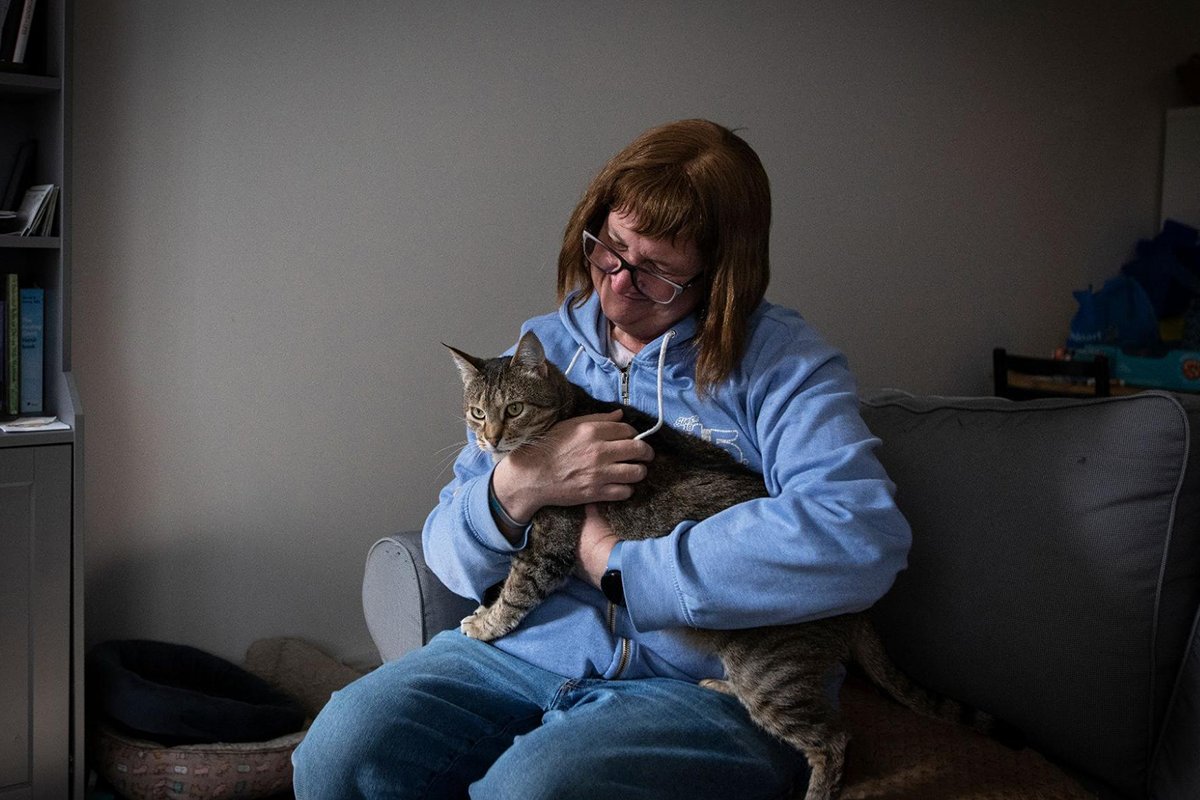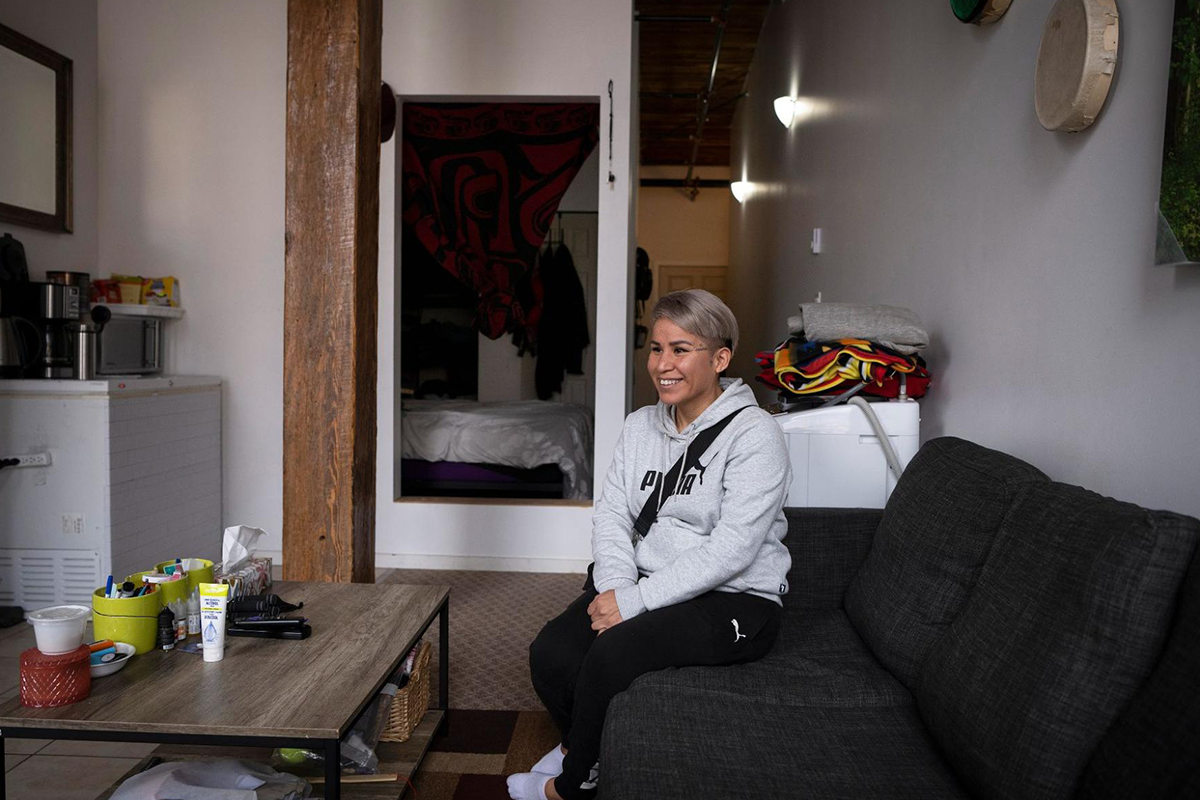First Atira housed their clients, now they’re housing their staff — could other non-profits follow suit?
Why It Matters
Many employees at frontline community services organizations face the same barriers as their clients when it comes to affordable housing: a steeply rising cost of living and low wages. A first-of-its-kind staff co-op could offer an alternative housing model for organizations looking to support their workers.

Little Michelle used to spend an hour travelling to work and nearly two hours getting home to her basement apartment. But thanks to a new housing co-operative, she and her partner now live in Vancouver’s Gastown neighbourhood, only minutes from Atira Women’s Resource Society, where Michelle provides cultural support to Indigenous women.
“It’s a really great building, you can have pets and there’s free laundry,” she says. “And I really appreciate that it’s an old building with the high ceilings; there’s original brick and wood too. We also have a pretty good view of the water.”
The 31-unit residential project is the first of its kind in British Columbia, if not Canada; a housing co-op founded by a non-profit on behalf of its staff.
Atira, which funds transitional housing and support services for women affected by violence and abuse, laid the groundwork for the staff co-op during the pandemic. A funding surplus, generated by temporarily unfilled staff positions, coincided with the opportunity to lease a five-storey building previously used for short-term rentals.
Atira CEO Janice Abbott says many of the organization’s staff members live in single room occupancy hotels, also known as SROs, with shared bathrooms, no kitchens, little privacy and poor security. The Atira Workers Housing Co-Op offers residents — many of whom have lived experience with mental illness, homelessness and addiction — safety and stability, she says.
“The benefits are obvious: we have staff that are able to sleep at night, their presence at work is improved, their mental wellness is improved and they aren’t spending hours commuting,” she says.
“They also talk about feeling safer and about being part of a community.”
Jodi Gray describes the new housing co-op as a place of refuge. Prior to moving into the Powell St. building, Grey lived in a basement apartment where she faced discrimination from her landlord.
“I’m transgender and I just didn’t really feel safe in my last place, but because housing is so expensive in Vancouver, I didn’t really have anywhere else to go,” says Grey, who manages an Atira building for two-spirit and transgender people. “But the co-op is incredible. There’s such a community there.”

The co-op’s rent is geared to income, with each tenant paying 25 per cent of their salary towards housing costs, exclusive of electricity. That means many units are subsidized, but not all of them — some staff pay what might be considered low-end market rates.
Michelle pays $1,125 per month for a one-bedroom unit, which is more like an extended bachelor suite. She says similar apartments in the neighbourbood — Vancouver’s oldest and a tourist hot-spot — might go more than twice that amount.
Making the leap from what’s essentially “shelter rate rent to market rent” is a huge challenge for many people in Vancouver, Abbott says. Single people have an especially difficult time affording housing, she adds.
“We have had staff who could afford to pay more rent, but were living in supportive housing because nothing else was available,” she says. “And because they were living in supportive housing, and didn’t need to be in supportive housing, they were being negatively impacted.”
Skyrocketing rents
Abbott says, on average, Vancouver rents have increased 54 per cent over the last three years — far more than even the most generous wage increases in either the private or non-profit sectors.
“We would love to be able to pay salaries to everybody that enabled them to afford market rent in Vancouver,” she says, “But we’re a non-profit organization — we get government funding and so every year you negotiate with government about funding and wages … and you get what you get.”
According to the online rental service Zumper, the average rent for a one-bedroom apartment in Vancouver is now $2,600 per month or $31,200 per year. That means even someone earning a salary of $100,000 would struggle to keep their housing costs within the Canadian Mortgage and Housing Corporation’s guidelines, which recommend spending no more than 32 per cent of one’s income on rent.
British Columbia is Canada’s most expensive rental market; rents have increased 18 per cent in the last year alone, something experts link to a shortage of rental properties. “The vast majority of people who work in Vancouver cannot afford to live here,” Abbott says.

Wage stagnation further compounds the issue. The average community non-profit employee makes about $18,000 less than someone working in the overall economy, according to a recent study released by Imagine Canada.
Statistics Canada data shows those working in the overall economy, excluding the self-employed, earned an average of $57,137 in 2019. Those employed by community non-profits — which might provide goods and services like childcare, advocacy, access to the arts and social services — earned an average of $38,716.
Using the 32 per cent guideline, that translates to just $1,032.43 per month for housing costs. But Michelle doesn’t think increased wages alone would solve the housing crisis.
“I feel like even if you have a full-time job and even if you’re making more than $30 an hour, it’s still not enough, because you’re almost just working paycheck to paycheck,” Michelle says.
“Maybe if you’re getting paid like $45 or $50 an hour, but that’s a pipe dream.”
“It’s just unrealistic to think that every organization, and especially a non-profit, could afford to pay people enough to live in this housing market,” Gray adds.
Co-ops offer a unique affordable housing solution, says Thom Armstrong, CEO of B.C.’s Co-operative Housing Federation. But it takes an upfront investment many employers may not be positioned to make.
“The actual creation of the co-op as a legal vehicle is really simple, we do it all the time,” he says. “The challenge when you’re dealing with a housing co-op, is a real estate challenge.”
Federal programs supported the creation of housing co-ops in the 1970s and 1980s, but funding dried up in 1992. In recent years, however, the federal government has shown renewed interest in co-operative housing, as has B.C.’s provincial government, Armstrong says.
“It’s not an exaggeration to say there’s a resurgence in co-op development here in B.C.,” he says. British Columbia currently has more than 15,000 co-operative homes, but many co-ops — including Atira’s — have long wait lists.
“They’ve been such a wild success, not just because they’re affordable, but because they give people a say over their housing conditions,” Armstrong says. “They’re known to create safe, secure and really quite diverse communities; there’s a lot to like about the co-op model.”
He adds the Atira model is one that could be applied to other non-profits looking to expand their mandates to include employee housing. Abbott agrees, but says it took time and detailed planning to overcome the sense that employee housing was somehow a conflict of interest or an echo of indentured servitude.
Not company housing
Abbott says Atira avoided the pitfalls of so-called company housing — something historically associated with power imbalances, debt and precarity — by ensuring the co-op is governed by its own, completely independent, board of directors.
Atira sub-leases the Powell St. building to Atira Workers Housing Co-Op, but has no involvement in the building’s operations.
“So we’re not in the position as an employer or the company of having to evict anybody,” Abbott explains. “Those are all decisions made by the co-op board … they have complete control over how they operate their building and who they accept as members.”
Gray, who sits on the co-op’s board of directors, says all members must be Atira staff and those who move onto other employment will also have to move out of the building. “But we wouldn’t rush them out. We’d give them the time they needed.”
Unlike other types of housing, such as single-family homes or apartment buildings, co-ops require a lot of communication, education and discussion to find what works, Armstrong says. “The co-op model is such a good fit for a social purpose organization, but you need to be very clear on your mission when you start the process,” he adds.
A variety of local, provincial and federal organizations, like the Co-operative Housing Federation of BC or the Co-operative Housing Federation of Canada, are designed to assist new and existing co-ops, not just with legal or regulatory issues, but in creating communities that work.
“Anytime you put a group of people together, in close proximity, and ask them to work together on a common enterprise, you’re going to have great successes and you’re also going to have great challenges,” Armstrong says. “But the difference is that the co-op model gives you a mechanism to work out those differences. It’s one member one vote, so it’s a very democratic, very grassroots structure that gives people control over their housing and their community.”

Michelle doesn’t know if she’ll stay at the co-op in the long-run, but says it’s the right fit for her at the moment. The building’s common area, filled with couches and a pool table, gives her a place to visit with friends and enjoy the sense of community that comes with living next door to your colleagues.
“I think we mostly understand each other because we all do the same kind of work,” Michelle says. “And I feel like it would be great if more (employers) did this … there’s still stuff to tweak on a little on some things, because it’s still fairly new and we’re all still learning, but I think we’re all learning together.”
